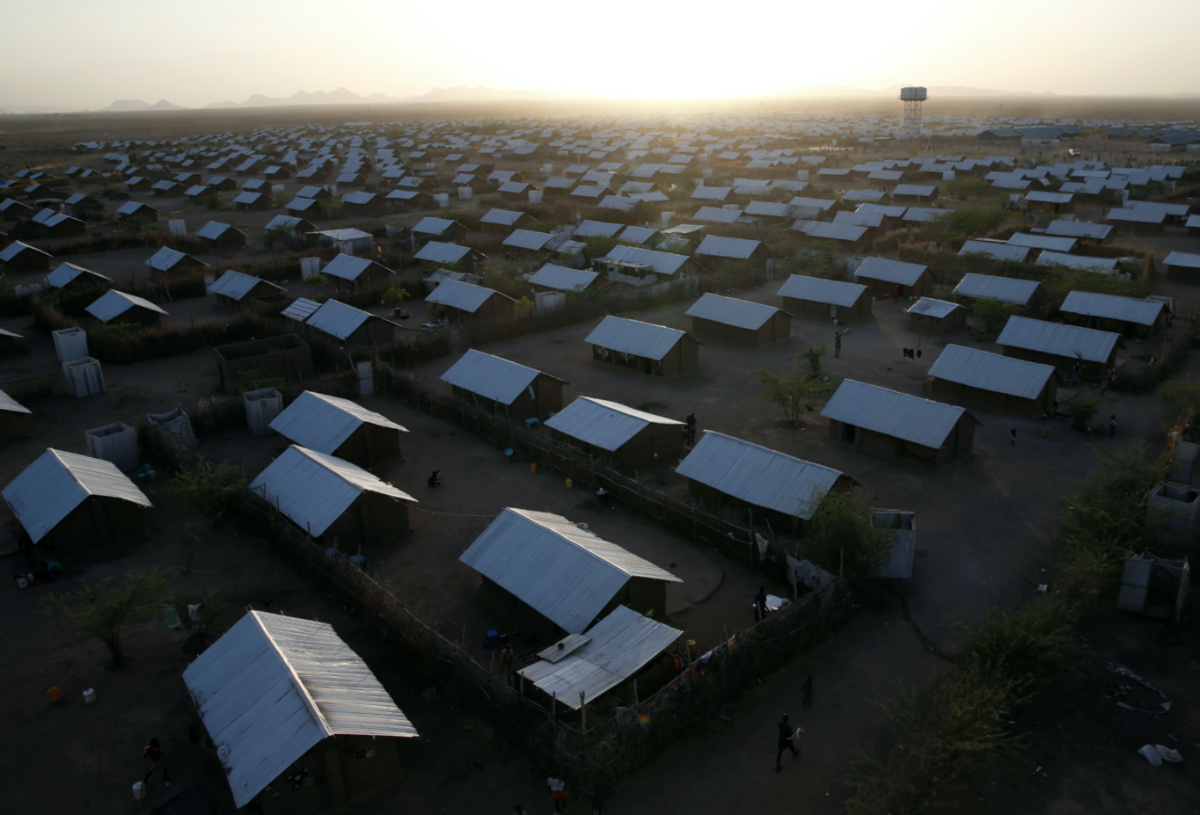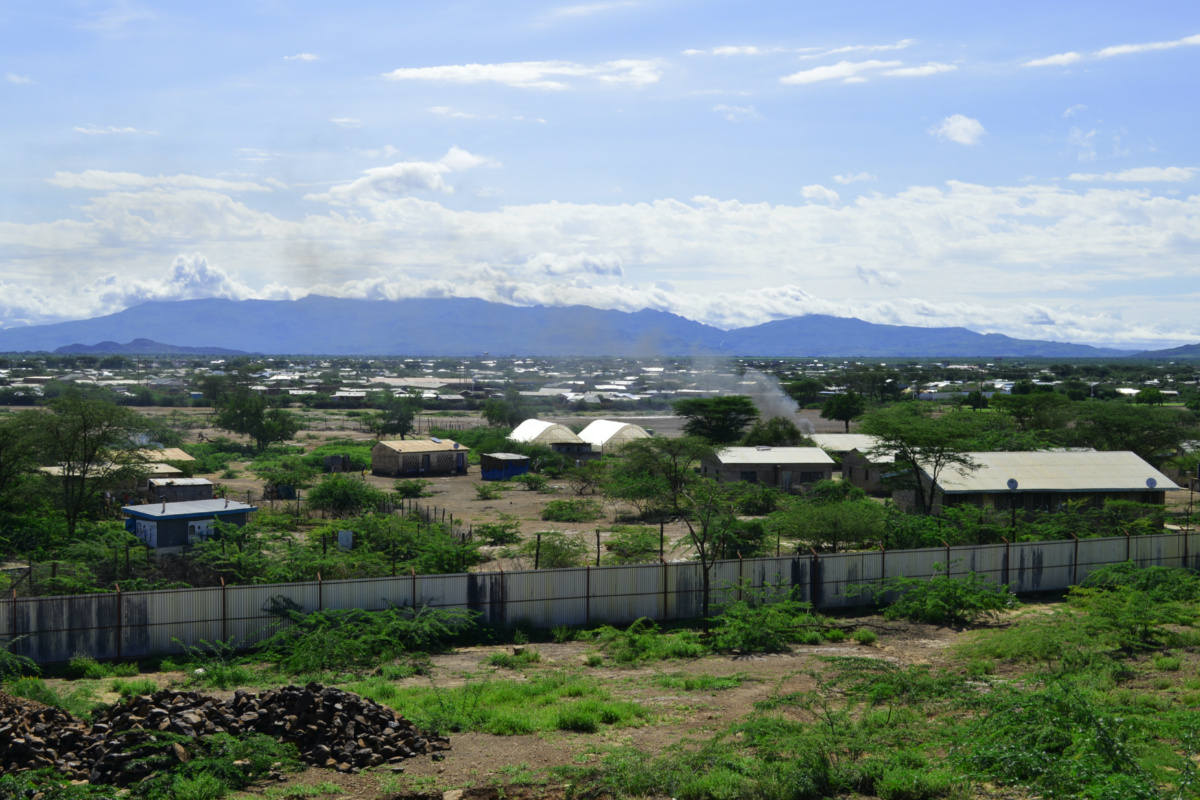
TONNY ONYULO reports on the plight of the LGBTQ asylum-seekers and refugees in Kakuma Refugee Camp in Kenya…
Kakuma refugee camp, Kenya
Sitting on a traditional three-legged stool outside his tent in this dusty, sprawling United Nations camp, Joseph Kabugo tearfully narrates how he escaped death by a whisker in early June after unidentified criminals accused him of being gay and set his house ablaze by in his home town of Mbale in eastern Uganda.
“The attackers struck at night when I was asleep,” says the 32-year-old man, requesting this publication not disclose his real name for security reasons. “They wanted to kill me. When I hurriedly opened my door, one of the attackers cut my arm and shoulder several times. I managed to escape. They followed me as I disappeared inside the nearest bush.”

An aerial view shows recently constructed houses at the Kakuma refugee camp in Turkana county, north-west of Nairobi, Kenya, on 31st January, 2018. PICTURE: Reuters/Thomas Mukoya
Fearing his life, Kabugo says he began his journey that night towards the Kenyan border to seek refuge in the camp that hosts more than 200,000 refugees from South Sudan, Sudan, Somalia, the Democratic Republic of the Congo, Burundi, Ethiopia, and Uganda.
“I had no money, but I begged people until I found one woman who sympathised with me and gave me enough money to take me to this camp,” he says, recounting his arduous journey as tears ran down his face.
“The attackers struck at night when I was asleep. They wanted to kill me. When I hurriedly opened my door, one of the attackers cut my arm and shoulder several times. I managed to escape. They followed me as I disappeared inside the nearest bush.”
– Joseph Kabugo, not his real name, who was forced to flee to Kakuma after he was attacked in his home town of Mbale in Uganda.
Kabugo says Uganda’s new anti-gay law, one of the toughest in the world, triggered his attack after President Yoweri Museveni signed the bill into law on 29th May last year, calling for life imprisonment for anyone convicted of homosexuality and the death penalty for ‘aggravated homosexuality’.
“When the bill was signed into law by the President, people started attacking others based on their sexual orientation and gender identity,” he says. “The police never arrested them, and those few people who reported the attacks to police were arrested and charged.”
Kabugo is among hundreds of LGBTQ+ asylum-seekers and refugees who have fled their countries to escape homophobia and persecution and have turned this camp, established in 1992, into a kind of prison.
Since the beginning of this year, hundreds of LGBTQ+ people from East African countries have fled to refugee camps throughout East Africa to desperately seek safety from anti-gay laws. In Kakuma Refugee Camp, for example, officials said they have this year recorded more than 150 LGBTQ+ refugees, mainly from Uganda, after Museveni’s anti-gay law took effect, drawing Western condemnation and risking sanctions from aid donors.
The LGBTQ+ refugees in Kakuma say their situation in the camp is being worsened by some religious leaders and other refugees who have also sought asylum.
“Christians, church leaders, and even other refugees here don’t like us,” says Moses Katende, who lives at the camp located in northern Kenya. “Most pastors don’t allow us to go to church, and when we happen to go, they incite congregants to attack us. We face rejection here as LGBTQ+ refugees, but we survive because it’s not severe like in Uganda and other countries.”
Pastor Akol Aluol Mawet, of the Pentecostal church in Kakuma Refugee Camp, agrees. He says churches in the camp and elsewhere can’t accept LGBTQ+ refugees to fellowship with others unless they repent and turn to God. He says the Bible condemns homosexuality and quotes a passage from Leviticus 20:13 which states that “If a man lies with a male as with a woman, both of them have committed an abomination; they shall surely be put to death; their blood is upon them.”
“Therefore, we cannot allow LGBTQs in churches because homosexual behaviour is a sin and contrary to the word of God,” says Pastor Mawet. “We don’t encourage the attack on LGBTQ as long they don’t come to church. We only allow them after they have repented and accepted Jesus Christ.”
Katende says such utterances from church leaders and others in the camp are putting their lives in danger.
“We are afraid about the security of LGBQ people throughout Africa because the majority of them are suffering in silence, and others have been killed, tortured, and shunned by their families and communities,” he says, noting that the camp has more than 700 LGBTQ+ people.
“Most of them are facing trauma because of the things they have gone through – such as stigmatisation, rape, arbitrary arrest by police, physical attacks, and denial of essential services like education,” he adds
Pastor Peter Deng, of the Evangelical Church of South Sudan, is based in the camp. He has been urging Christians and refugees to be tolerant of the LGBTQ+ people, saying God loves everyone, including the LGBTQ people, “because they are God’s children”.
“We are all sinners despite our sexuality, and it’s only through Jesus Christ that we can all be forgiven,” he said, noting that he has been helping the gay community with basic needs such as food, medicine, and safe shelter. “The LGBTQ people are never wanted in the camp, but I try to encourage refugees and other pastors through holding workshops to convince them to welcome the LGBTQ community.”

Kakuma Refugee Camp in Kenya. PICTURE: Adriana Mahdalova/iStockphoto
Pope Francis has, on several occasions, urged the Catholic Church to open to everyone, including the gay community, noting that homosexuality was not a crime. On 18th December last year, the Pope approved a declaration allowing priests to bless same-sex couples.
Some of the LGBTQ+ Catholics in the camp welcomed the declaration only to be rejected by priests and congregants after they sought to attend the Mass. Catholic bishops in Africa and Madagascar later issued a statement, vowing never to follow Francis’ declaration as it was “contrary to the will of God”.
Katende said the situation will only worsen for LGBTQ+ people in the camp unless something is done to save them from attacks and forceful displacement.
The United States has already responded and imposed visa restrictions on dozens of Uganda officials in response to the country’s anti-gay laws. The US has also threatened trade sanctions. American officials are still reviewing nearly $US1 billion of aid towards the East African nation of more than 45 million.
In August, the World Bank also announced that it was halting new loans to the landlocked nation, noting that the new anti-gay law contradicted its core values.
“We believe our vision to eradicate poverty on a livable planet can only succeed if it includes everyone irrespective of race, gender, or sexuality,” the World Bank Group said in a statement on 8th August last year. “This law undermines those efforts. Inclusion and non-discrimination sit at the heart of our work around the world.”
We rely on our readers to fund Sight's work - become a financial supporter today!
For more information, head to our Subscriber's page.
Human rights organisations have also advocated for the rights of LGBTQ+ people in Kakuma,
In 2023, Amnesty International released a report documenting stories of torture and abuse against LGBTIQ+ refugees – including hate crimes, rape, arrest and eviction.
“LGBTI individuals in Kakuma camp have suffered physical and sexual violence and other serious human rights abuses, including violations of their right to be free from torture and ill-treatment, because of their sexual orientation, gender identity and/or expression, or sexual characteristics,” Victor Nyamori, Amnesty International’s Researcher and Advisor on Refugee and Migrants Rights, said during the release of the report on May last year.
The organisation has been urging the Kenyan government to protect LGBTQ+ asylum seekers and refugees by arresting those violating their rights.
“The authorities must discuss and agree with affected individuals and the wider LGBTI community on measures to prevent and effectively respond to hate crimes and other forms of discrimination,” the report said, calling on third countries to increase pledges for resettlement.
Meanwhile, in Kenya some legislators are pushing for Uganda-style anti-gay laws. Similar moves are also afoot in Tanzania and South Sudan. If passed, there are fears the new law could further push LGBTQ+ people to refugee camps.
Cynthia Waweru, a Kenyan LGBTQ+ refugee, says the proposed anti-gay laws have already validated attacks on LGBTQ+ people in the country. This situation prompted her to seek refuge at the Kakuma Refugee Camp last month.
“We are prisoners here because no one wants to see us, including our families,” she said, noting that she escaped her hometown of Thika in central Kenya after her neighbours condemned her as a lesbian and attacked her with machetes. “Something needs to be done for us to be safe. Nowhere in Africa is safe for the LGBTQ people.”






